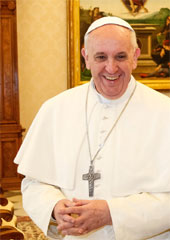Pope Francis: U.S.-Cuba Matchmaker
What the U.S.-Cuba deal tells us about the future of Vatican diplomacy in a multi-polar world.

Pope Francis (Credit: Roberto Stuckert Filho/Agência Brasil)
The hope, even the enthusiasm, created by the mutual signals of appeasement the United States and Cuba gave to the world in mid-December 2014, was accompanied by public recognition of Pope Francis’ major role in bringing the two historic enemies back to dialogue.
This outcome could not have taken shape without some key factors. The first is the continuous presence of the Catholic Church on the ground in the Caribbean island. The second is the Latin American identity of the pontiff.
Both of these factors were pivotal in helping both the United States and the Castro regime in Cuba sneak out of a difficult situation – one that was becoming increasingly comical, given how completely outdated the Cold War really is in the Americas by now.
A continuous force in Cuba
The Vatican has maintained the presence of a papal Nuncio (equivalent of an ambassador for lay states) in Havana.
It is noteworthy, however, that the Argentinian Archbishop Jorge Mario Bergoglio, now Pope Francis, had promoted the strongly anti-communist “theology of the people” in his own country.
The “theology of the people” lies between liberation theology, influenced by Marxism, and right-wing dictatorships.
A Latin American pope for a Latin American problem
One of Pope Francis’s key aims is spreading freedom of religion and democracy all over the Spanish-speaking Americas and in Brazil.
The Pope knows Cuba’s problems very well. He also reaps the fruits of John Paul II and Benedict XVI’s strategic work on the issue.
But what matters most is that the Cuban ailing nomenklatura does not view Francis as a traditional “Westerner.”
He is not seen as someone promoting and reflecting the values and interests of the western world, dominated by the United States.
The Pope is considered a true mediator, a Latin American thoroughly emancipated from Cold War culture and paradigms.
With his outspokenness, he has proven to be a natural ally to – but also a severe critic of – U.S. strategies on key topics on the global agenda as well as in various countries of the Global South.
The man in the honest middle
That very rare positioning allows him to be a reliable interlocutor in the eyes of leaders who need a kind of “alternative West” to deal with. This alternative didn’t exist before.
John Paul II, a Pole, was fundamentally an anti-communist warrior – and too firmly positioned in the “American camp.”
Benedict XVI, the German pope, perceived that things were changing on that economically failed communist island, but he was overwhelmed by Vatican internal conflicts and forced to focus on them.
The global landscape has also shifted significantly. Multi-polarism is a matter of fact, no longer just an aspiration.
Pontiff without borders
Francis is an adventurous destroyer of this outdated world where so many things neatly lined up in certain “camps.” He doesn’t recognize the East-West divide.
If anything, he may be a “southerner,” in terms of those world categories. For sure, he is a man without any sympathy for borders and divisions.
Under Francis, the Vatican established itself as a balanced international actor in the Syria crisis in September 2013, when it contributed to prevent an armed intervention of the West. He played shrewdly to get Obama and Putin to cooperate on chemical weapons.
Resisting holy wars
While Popes for centuries tended to foster or encourage clashes, the current Vatican does not want a new Cold War to turn into a religious Cold War.
Being a champion of soft power under Francis, the Vatican can achieve these goals only when civil powers are keen to reach an agreement.
At the same time, Francis cannot “create” peace without a mutual desire of his interlocutors to share similar goals.
A win-win for both countries
That is also why a deal between Cuba and the United States was possible. Both countries wanted to get out of an untenable situation.
The Raul Castro regime needs to open up, because its population is tired, impoverished and eager to become part of the world at large. Communism has long become an empty shell which nobody fears anymore.
The United States, for its part, has an obvious interest in normalizing the relations with a long-time adversarial regime in its geopolitical backyard.
Lest the United States wanted to risk pushing Cuba – and some of its friends in the region – into China’s economic and strategic orbit, it had to act.
Given the fragility of the situation not just in Cuba, but also in Venezuela and other countries in the region, it had to act now.
Not doing so at this juncture would have been a replay and a caricature of the way in which the United States under John F. Kennedy preferred ideology over pragmatism – and pushed revolutionary Cuba into the Soviet Union’s arms.
Moscow, under Khrushchev, was a happy recipient of such American shortsightedness.
Furthermore, the continued presence on the Cuban territory of the U.S. Guantanamo Base prison for 9/11 Islamic terrorists has become a real source of international embarrassment for the United States.
Easing the relations with Cuba might help the United States to solve the problem more quickly.
Latin America’s Berlin Wall moment
The Latin American press labeled the U.S.-Cuba deal as “the fall of our Berlin Wall,” Europe’s iconic symbol of Cold War separation until November 1989. Effectively, it’s a geopolitical and geo-religious milestone for the continent.
Those who met Francis before Christmas found him exultant about the result of his mediation over Cuba. That is more than understandable.
It is a moment akin to that in 1989, when Pope John Paul II helped apply pressure to bring down the Berlin Wall. A quarter century later, another Pope has now managed to prove a pivotal factor in turning a historic page for another continent.



























